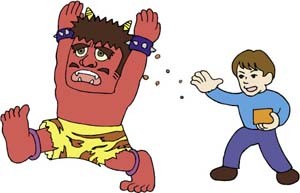Japanese

What is Setsubun?
The
term Setsubun originally referred to the four days marking the change from one season
to the next, but today only the eve of risshun (the first day of spring according to the lunar calendar) is referred
to by that name. Setsubun falls on either February 3 or 4, depending on the year.
Setsubun is not a national holiday.
What do you do in Setsubun?
Bean-throwing Ceremony
On Setsubun evening, many households enjoy mame-maki, a
bean-throwing ceremony. People fill a
wooden measure with roasted soybeans and throw them in and around their houses,
shouting “Oni wa soto! Fuku wa uchi!”
which means “Out with demons! In with good luck!” This ceremony is performed to bring in good
fortune and drive away evil spirits. One
person usually acts as the demon and runs around, while the others throw beans
at him/her. It is customary for people
to pick up and eat the same number of beans as their own age.
Bean-throwing
ceremonies also take place in shrine and temple compounds. Well-known personalities, such as
politicians, sumo wrestlers and actors, are invited as special guests to throw
good luck beans for all those present.
Men and women born under the Zodiac sign for the year can also participate
in the event.
Mame-make originally started as an imperial event on New Year’s Eve to get rid of
demons and welcome a happy New Year.
Later it was mixed with the indigenous custom of throwing soybeans at
the time of planting rice seedlings. Since the
Yakikagashi / Yaikagashi (grill
and smell)
 Another less popular custom of Setsubun night is to tack a grilled sardine head pierced with a holly branch over
the entrance of one’s house to drive away evil spirits by the strong smell
of the sardine and the sharp tips of holly leaves.
Another less popular custom of Setsubun night is to tack a grilled sardine head pierced with a holly branch over
the entrance of one’s house to drive away evil spirits by the strong smell
of the sardine and the sharp tips of holly leaves.
Eat an entire sushi roll
![]() There’s a saying that your dream will come true if on the evening of Setsubun you
are able to eat the entire sushi roll, facing that year’s lucky direction,
without saying a word. This custom is
commonly practiced in western
There’s a saying that your dream will come true if on the evening of Setsubun you
are able to eat the entire sushi roll, facing that year’s lucky direction,
without saying a word. This custom is
commonly practiced in western
References
Kidsweb(http://jin.jcic.or.jp/kidsweb/index.html)
FFORTUNE(http://www.ffortune.net/calen/setubun/mamemaki.htm)
japan-guide.com(http://www.japan-guide.com/e/e2285.html)
Talking about